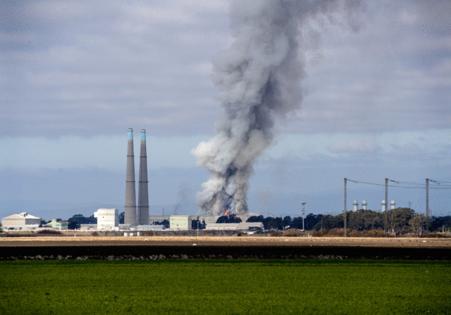After major fire, California county weighs ban on new battery plants
Published in Business News
Nine months after a huge fire at a battery storage plant in Moss Landing raised questions about how to balance public safety with California’s ambitious plans to expand renewable energy, officials in Monterey County will consider a proposal Tuesday to impose a moratorium on the construction of other new battery facilities.
Monterey County Supervisor Glenn Church, whose district includes Moss Landing, said he hopes the proposed rules will be copied by other cities and counties across California as dozens of the plants are being constructed every year, often near homes, schools and businesses.
“California is going to need more battery facilities,” Church said. “But we need to make them safe. They are very volatile. It’s a new technology that’s evolving. What was used five years ago is considered old technology now. Every few years it’s changing. We need to do more to be on top of the safety, health and environmental concerns.”
A fire on Jan. 16 at the Moss Landing Plant — which is owned by Vistra, a Texas-based energy company — was the largest battery storage fire ever in the United States and made national news. It burned for two days, incinerating more than 50,000 lithium-ion batteries and sending a toxic cloud over Monterey Bay and nearby communities. Authorities evacuated 1,200 local residents, many of whom complained of headaches, breathing problems and other issues afterward. The fire raised questions about the safety of battery storage facilities that are being proposed and built across California and other states.
On Tuesday, the Monterey supervisors will consider a proposal from Church to direct the county staff to draft a moratorium and return to the board for a final vote within a month.
If the board passes the moratorium, the county staff would take 1 to 2 years to create detailed new regulations affecting such issues as where the plants can be built, fire safety, emergency management policies, and post-fire cleanup rules, Church said.
A few other counties in California have passed similar measures.
Last year, Solano County, in the North Bay, approved a moratorium of new battery storage plants after residents raised safety concerns. In August, Solano County supervisors lifted it, but put in place new rules allowing the facilities to be constructed only on land zoned for industrial or manufacturing uses, rather than agriculture, residential or other uses.
Orange County officials enacted an emergency moratorium on new large-scale battery storage facilities in February, following the Moss Landing fire, while county officials there work with fire departments to draft new local regulations.
On Monday, renewable energy industry groups say they oppose local moratoriums.
“Blanket bans on any source of clean power are the wrong approach for California at a time when electricity demand is rising,” said Molly Croll, senior policy director for the American Clean Power Association’s California office.
Instead, she noted, the Governor’s Office of Business and Economic Development, a state agency that promotes economic growth, is working on model ordinances for cities and counties relating to battery storage sites.
California has seen a massive increase in the growth of battery storage plants in recent years, going from 17 in 2019 to 187 today. Many more are planned across the Bay Area, in the Central Valley and Southern California.
The plants store electricity just like batteries in cell phones, laptops, or electric cars.
They essentially allow renewable energy to power the state 24 hours a day, making it a viable alternative to fossil fuels like natural gas and coal. The plants are needed to store electricity generated by large solar and wind farms to release it back on the power grid at night when the sun isn’t shining, or the wind isn’t blowing. California lawmakers have set a goal of generating 100% of the state’s electricity from renewable and carbon-free sources by 2045 to meet the state’s climate change and air pollution goals.
Community advocates near the Moss Landing plant said Monday they support a moratorium in Monterey County.
“We support renewable energy. Our concern has been with the volatility and danger of the lithium-ion technology that is used to store the energy,” said Brian Roeder, co-founder of Never Again Moss Landing, a community group.
“Once these things catch fire, the emissions are incredibly harmful to living creatures,” he said. “It’s a long-term impact that can lead to chronic illness.”
The issue was debated all year in the state Legislature. Renewable energy companies and labor unions strongly opposed a bill by Assemblywoman Dawn Addis, D-San Luis Obispo, which would have prohibited construction of new battery storage plants within 3,200 feet of homes, schools, hospitals, parks and prime agricultural land.
That bill, AB 303, also would have reversed a state law passed two years ago that gives a state agency, the California Energy Commission, the authority to overrule local cities and counties to approve large battery storage plants of 200 megawatts or more. It failed to get a hearing in the Democratic-controlled Legislature.
Instead, Gov. Gavin Newsom signed a bill supported by the industry and labor unions, SB 283, by State Sen. John Laird, D-Santa Cruz. That new law requires energy companies to meet with local fire officials when they are drafting emergency response plans, and have the facilities inspected by them before they begin operation.
That new law, Croll said, along with the state’s upcoming model ordinances, “will allow California to keep its grid reliable while keeping communities safe.”
©#YR@ MediaNews Group, Inc. Visit at mercurynews.com. Distributed by Tribune Content Agency, LLC.












Comments